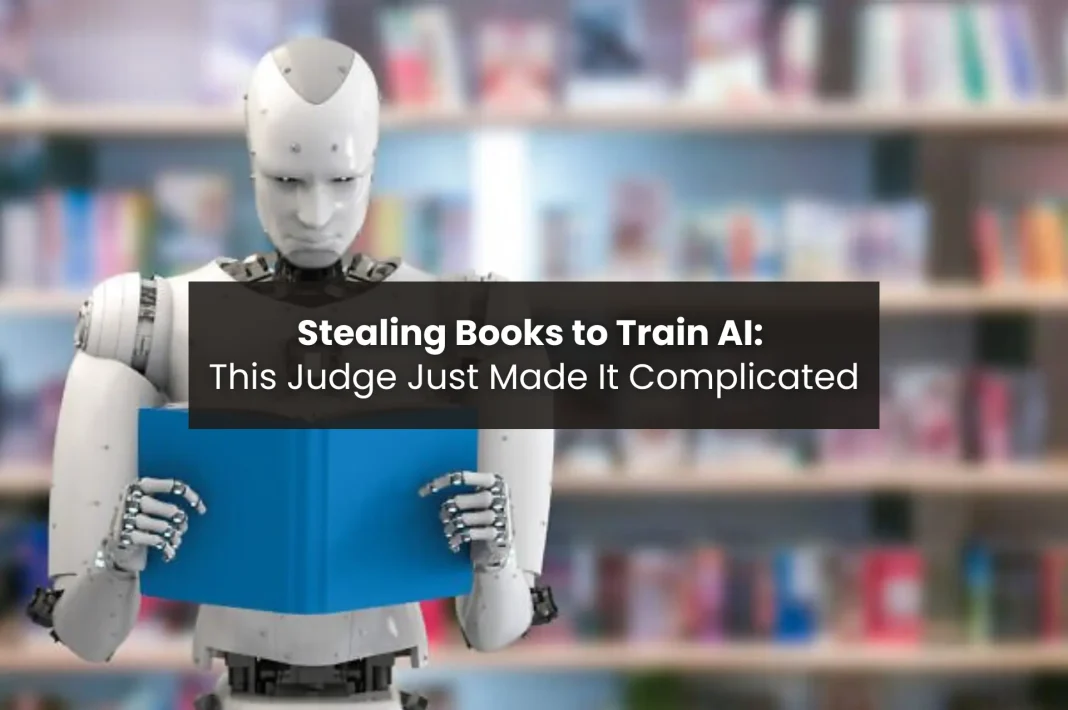How AI Model Training Landed Anthropic in Court?
In August 2024, authors Andrea Bartz, Charles Graeber, and Kirk Wallace Johnson sued Anthropic for using pirated copies of their books in its AI model training, Claude. They claimed the company scraped their work from illegal sources online without permission or payment. Rude much? Anyway, the lawsuit didn’t just call out a single tech firm. It challenged the way AI models are built altogether. At the heart of the complaint was a bold accusation that Anthropic knowingly fed stolen content into its training system.
This case is part of a growing legal wave. Writers, artists, and creators across industries are pushing back against AI companies that have been quietly using their work. The real question is simple. Can tech companies freely use copyrighted books, songs, and scripts to train AI without paying for them? Honestly, using someone else’s work without paying for it is intellectual piracy, and there’s no denying that.
Judge Alsup’s Ruling on AI Model Training
According to Bloomberg Law, Federal Judge William Alsup delivered a ruling that almost gave a heart attack to both the creative and tech worlds. He declared that training AI models like Claude on legally purchased and digitized books falls under fair use. Calling the process “exceedingly transformative,” he noted that it does not replace or compete with the original market for those books. This wasn’t just another court opinion.
It’s the first time a federal judge tackled the fair use question in the context of generative AI. For tech companies, it was a green light, at least partially. The decision allows AI developers to claim fair use for AI model training only when they legally obtain the data. But here’s the catch. This is not a free pass. The ruling only protects training done on content that was acquired the right way. If a company buys a book and uses it to teach an AI in a way that doesn’t copy or resell the original, that use may qualify as fair. Anything outside that boundary still risks legal fallout.
Game-Changing Verdict
Anthropic may have scored a partial legal win, but the real trouble begins with what comes next. Court documents revealed that co-founder Ben Mann downloaded millions of pirated books to train Claude. These illegally sourced texts became a key part of the AI model training process. Judge Alsup was clear. Using stolen content does not fall under fair use, no matter how innovative the output looks. Buying the book after the fact does not undo the original copyright violation. A jury trial is set for December 2025 to determine if this was willful infringement. If found guilty, Anthropic could face billions in damages. The trial will also examine internal plans to build a permanent database of all books in existence. That idea raises not just legal red flags but serious concerns about control over global information. After all, the books are also someone’s intellectual property.

Implications for the AI Industry
This case is bigger than Anthropic. Judge Alsup’s ruling just sent a message across the AI industry. Every major player from OpenAI and Meta to Google and Microsoft is watching closely. Until now, AI developers have often operated in a legal gray zone with little regard for how they source training data. Now the line is sharper. If you legally obtain the content and use it in a transformative way, fair use might apply. But pirated or scraped content with no permissions or licenses is a legal landmine. Whether you’re a startup or a tech giant, the takeaway is clear; AI model training needs a clean paper trail. Where your data comes from matters. Ethical sourcing is no longer optional; it’s the difference between innovation and getting sued. And as AI systems like Claude grow more advanced and autonomous, some argue they might be too smart for their own good. Anthropic AI’s Claude 4 Might Be Too Smart for Its Own Good dives deeper into the capabilities that make these models both powerful and controversial.
Is It Fair Use or Just a Fancy Way to Steal?
Fair use has always been a grey zone in copyright law, but AI model training is taking that grey to a whole new level. Judge Alsup’s ruling offers a starting point, but the debate is far from over. Critics argue that AI models devour massive amounts of copyrighted content without permission, and creators get no credit or compensation. Supporters say AI is not copying but learning, just like a human would from books. The court agrees that AI model training can be transformative, but also warns that the legal and ethical boundaries are still blurry. As models grow smarter, the question of what truly counts as fair use is only going to get messier. But selling will never be an option.
To Wrap It Up
The Anthropic case marks a turning point for how the law views AI model training. Judge Alsup’s ruling clarifies fair use when content is legally sourced, but also draws a clear line against pirated material. As the trial progresses on the use of illegal book copies, the stakes are massive. Billions of dollars hang in the balance, but so does the blueprint for how developers build AI models going forward. This case does not end the debate. It starts a new chapter where courts will judge AI model training not just by what it can do but by how it gets there, legally or with pirated data.
Until we meet next, scroll!
